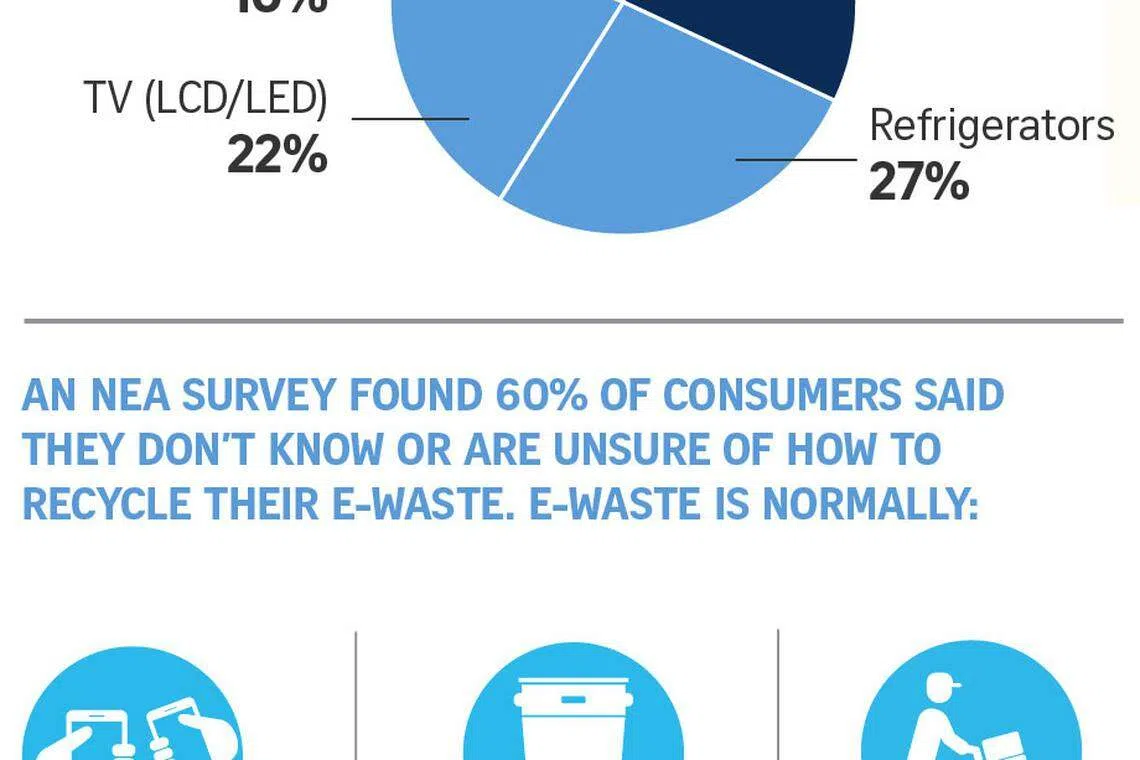Singapore government to consult public on tackling e-waste problem
THE government will be launching a public consultation session in February to better tackle the problem of electrical and electronic waste (e-waste).
This comes on the back of a study by the National Environment Agency (NEA) which showed that 60 per cent of Singapore residents are either ignorant or unsure of how to recycle their e-waste.
Over 60,000 tonnes of e-waste are generated in Singapore each year. This works out to about 11 kg of e-waste for each person, equivalent to the weight of 73 mobile phones, said NEA.
The study, conducted between April 2016 and October 2017, found that while e-waste of high value are typically traded in or sold, the rest are discarded with general waste.
Bulky e-waste such as washing machines and refrigerators are mostly carted away by delivery men when new appliances are delivered, and some end up with scrap traders and rag-and-bone collectors who dismantle unusable equipment and trade the parts with recyclers.
These present a few problems, according to the NEA.
For one thing, many of these collectors do not have the capability to maximise resource discovery from e-waste. As a result, only components of significant value are recycled.
Secondly, e-waste that is not recycled is incinerated. Not only is there a loss of resources, carbon emissions are also generated, contributing to global warming and climate change.
Thirdly, the processing of e-waste by these collectors involves poor environmental practices, such as the venting of harmful refrigerants to the environment, and can result in workplace hazards.
Singapore has so far adopted a voluntary approach, with NEA having formed 17 partnerships with industry stakeholders, including producers and retailers such as Panasonic and StarHub.
There are, however, limits to such an approach, NEA noted.
"Such programmes typically only result in the collection of portable info-communication technology (ICT) equipment, and the amount of e-waste collected is only a fraction of the total amount of e-waste generated annually," it said.

In studying best practices in established e-waste management in countries such as Germany and Japan, NEA found that active participation of stakeholders, and in particular brand owners and manufacturers, is necessary.
In these systems, producers commonly ensure that their products are properly recycled once they are no longer used, by channelling the e-waste to formal recyclers. In New York, for instance, electronics manufacturers fund programmes for consumers to mail small e-waste to recyclers.
Many of these countries and cities also rope in retailers to provide convenient collection options for consumers. Large retailers in Germany and Sweden are required to provide e-waste collection points in their store as well as a free collection service for larger e-waste when the customer purchases a new product.
NEA further noted that in these places, e-waste recyclers are also regulated to ensure that their recycling processes meet high environmental standards.
The Ministry of the Environment and Water Resources and NEA are studying these best practices, and assessing their suitability for Singapore through stakeholder consultations with the industry, said the press release.
BT is now on Telegram!
For daily updates on weekdays and specially selected content for the weekend. Subscribe to t.me/BizTimes
International
Sunak says UK to raise defence spending amid global threats
China’s central bank hints it may add treasury bond trades to policy toolkit
US business activity cools in April; inflation measures mixed
India’s inflation at risk from extreme weather, geopolitical issues: central bank
Thailand to replace military-appointed Senate, reduce its powers
Bankers lose hope of London IPO revival for another year
